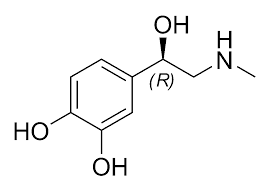adrenaline
英 [əˈdren·əl·ən
-ˌin]
- n. [生化] 肾上腺素

记忆方法
将“adrenaline”拆分为“ad-renaline”,记住“ad-”是表示“加强”或“额外”的前缀,而“renal”与肾脏(kidneys)相关,联想到肾上腺(adrenal glands)是分泌肾上腺素(adrenaline)的器官,因此“adrenaline”是加强版或额外的肾脏激素,帮助我们记住它是身体释放的肾上腺素,一种兴奋和紧张的化学物质。
以上内容由AI生成, 仅供参考和借鉴
中文词源
adrenaline 腺上肾素
前缀ad-, 去,往。词根ren, 肾,见renal, 肾的。-ine, 化学名词后缀。
英语词源
- adrenaline
-
adrenaline: [20] The hormone adrenaline is secreted by glands just above the kidneys. From their position these are called the ‘adrenal glands’ [19], a term based on Latin rēnes ‘kidney’, which has also given English renal [17] and (via Old French) the now obsolete reins ‘kidneys’ [14]. The discovery of adrenaline and the coining of its name are both disputed: they may have been the work of Dr Jokichi Takamine or of Dr Norton L. Wilson.
- adrenaline (n.)
- also Adrenalin (trademark name), coined 1901 by Japanese chemist Jokichi Takamine (1853-1922), who discovered it, from Modern Latin adrenal (see adrenal) + chemical suffix -ine (2). Adrenaline rush was in use c. 1970.
权威例句
- 1. The applause acted on her like a shot of adrenaline.
- 掌声犹如给她注射了一支强心剂.
- 2. He felt a surge of pure adrenaline as he won the race.
- 他赢得比赛时感到一阵激动.
- 3. We'll start with a bit of dancing to get the adrenaline going.
- 我们先跳一下舞热热身.
- 4. The center of these glands manufactures adrenaline.
- 这些腺的中心分泌肾上腺素.
- 5. The adrenaline was coursing through his system.
- 他感到一阵激动.
